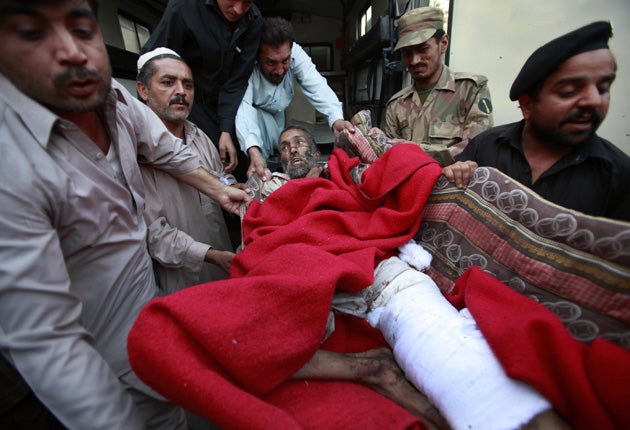At least 40 dead after Pakistan suicide attack
Atrocity demonstrates growing threat posed by Taliban insurgents

Taliban kidnappers who attacked Pakistan army's headquarters over the weekend were planning to hold senior army officers hostage until more than 100 militants were released from the country's jails, the military has claimed.
The news came as militants launched yet another attack on a military target in the country's north-west, killing dozens of people in a crowded market with a suicide bombing that emphasised how Taliban insurgents have strengthened their hand by developing ties with sympathetic militants outside of their traditional strongholds.
The strike on a military convoy near the Swat Valley, a suicide bombing, killed 41 people. The Taliban has already claimed responsibility. Officials said 35 civilians and six soldiers died when the bomber hit one of three military vehicles that were passing through a market in the Shangla district. Scores more were injured. "It appears to be a suicide attack. The bomber hit one of three military vehicles that were passing through the busiest market in the district," a senior police official, Khan Bahadur Khan, told Reuters.
Shangla lies to the east of Swat, which earlier this year was the focus of an intense military operation against the Taliban. The army says the Taliban has been largely ousted form the valley but yesterday's attack shows the militants have the capacity to carry out deadly strikes in that area.
As the Taliban claimed responsibility for the blast, further details on Saturday's audacious attack on the army's headquarters in Rawalpindi were beginning to emerge. Senior army officers said the assault was led by a notorious Punjabi militant known as "Aqeel" or "Dr Usman". Until 2004 he had served as a member of the Army's Medical Corps, at which point he abandoned the military's ranks and signed up with vicious militant outfit, Lashkar-e-Jhangvi, which is said to have close links to al-Qa'ida.
As the 22-hour drama unfolded, with militants holding more 40 army personnel hostage, Aqeel issued a list of demands, including the prisoners' release, the trial of former military ruler Gen. Pervez Musharraf, and the expulsion of American "bases" inside Pakistan. As it was, none of the soldiers being held were the senior officers sought by the militants, who - with the exception of Aqeel - were eventually killed by commandos.
The fall-out from the attack on the military's headquarters has lent fresh urgency for Pakistan to confront the burgeoning ranks of Taliban and al-Qa'ida-linked militants from across Punjab, Pakistan's wealthiest and most populous province, who have been increasingly co-operating with fighters based in the country's tribal areas.
Five of the 10 attackers came from various parts of Punjab and belonged to "splinter groups" belonging to Jaish-e-Mohammand and Lashkar-e-Jhangvi. Militants believed to be linked to both groups have been involved in fighting the Pakistan army in Bajaur, South Waziristan and most recently, the Swat Valley, said spokesman Maj Gen Athar Abbas.
Mr Abbas said the attack was orchestrated from the Taliban's mountainous base of South Waziristan, where the militants were also trained. He added that the army had obtained phone "intercepts," purportedly revealing senior Taliban commander Wali-ur-Rehman praying for the success of the assault.
There have now been four high profile attacks in a week, also including a suicide-bomb strike on the heavily-guarded offices of the UN World Food Programme in Islamabad that left five people dead and a car bomb attack on a busy market in the city of Peshawar killing 53. They have coincided with a build-up of government troops in South Waziristan as the military prepares to launch a major operation against Taliban and al-Qa'ida fighters there. Officials had warned the public to expect such retaliatory attacks and the Taliban had also vowed to step up their strikes in military and government targets.
Indeed, Azam Tariq, a spokesman for the Pakistan Taliban, indicted there would be no let up. "It was carried out by our Punjab unit," he told reporters, referring to the weekend's attack on the army's general headquarters. "We will take revenge for our martyrs and will carry out more attacks, whether it's the GHQ or something bigger."
Subscribe to Independent Premium to bookmark this article
Want to bookmark your favourite articles and stories to read or reference later? Start your Independent Premium subscription today.

Join our commenting forum
Join thought-provoking conversations, follow other Independent readers and see their replies